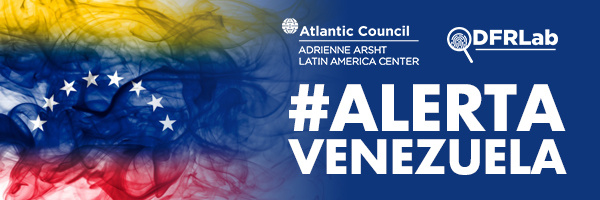Welcome to the first edition of #AlertaVenezuela, produced by the Atlantic Council’s DFRLab and Adrienne Arsht Latin America Center.
#AlertaVenezuela is leading the way in identifying, exposing, and explaining disinformation within the context of one of the Western Hemisphere’s largest crises in recent history, where the fight for control of the information space will continue to pose a challenge for the region. #AlertaVenezuela is leading the way in identifying, exposing, and explaining disinformation within the context of one of the Western Hemisphere’s largest crises in recent history, where the fight for control of the information space will continue to pose a challenge for the region.
If you would like to opt in to receive future editions of this newsletter, please sign up.
TOP STORY: Twitter suspended a top account in Maduro’s ongoing information operation

In September, Twitter suspended one of the most active accounts involved in the Maduro regime’s ongoing operation to position pro-regime hashtags among the trending topics on the platform. The account @tuiteros_vzla, also known as Tuiteros Patriotas, primarily amplified the daily hashtags posted by the Venezuelan Ministry of Communications and offered monetary compensation to users who tweeted out the hashtags.
Twitter did not reveal the exact reason for the suspension. The account’s last tweet was posted on September 11, 2019, when it had roughly 72,000 followers. A replacement account, @tuiteroz_vzla1, created in August as a potential backup, began tweeting similar content on October 3 but has garnered fewer than 300 followers to date. Despite the removal of the main Tuiteros account, the Ministry of Communications has still managed to place certain phrases and hashtags among the country’s Trending Topics on Twitter. In January, the DFRLab wrote about this ongoing state-backed Twitter operation.
TALK OF THE COUNTRY
The most shared and liked article about Venezuela across international media this week was “Venezuela wins a seat on the UN Human Rights Council,” published by The Washington Post. The piece describes the newly awarded seat as “a controversial victory for a regime accused of using intimidation, torture, and murder to cling to power.” The article garnered 123,200 likes, shares, and other types of engagement on Facebook, Twitter, and Reddit combined. On Facebook, the majority of interactions came from the pages “Nashville Tea Party,” “Joe Biden” (his official page), and “Republican Thinker.” Most engagement was critical of the United Nation’s decision.
Among the national Venezuelan press, the article that amassed the most interactions on social media this week was “Trotta: Mientras en la ONU elegían a Maduro, en Venezuela asesinaban a un dirigente opositor” (from Spanish, “Trotta: While the UN elected Maduro, in Venezuela an opposition leader was being killed”), published by independent website La Patilla. The story republished a quote by the Venezuelan Ambassador in Argentina, Elisa Trotta Gamus, in which she denounced the killing of a member of the Voluntad Popular political party, Edmundo “Pipo” Rada. The article amassed 6,500 interactions. On Facebook, the main amplifiers were the pages Nicas Unidos En Miami and OfficialLatinosForTrump.
The most popular post on Facebook this week was by Argentine president and presidential candidate Mauricio Macri. He shared a post (archive) from his Twitter feed that read: “Former president Cristina Fernandez de Kirchner awarded dictator Maduro with the Orden de San Martin. We recognized president Guaidó and denounced human rights violations in Venezuela.” The post garnered 53,300 interactions.
HASHTAG OF THE WEEK
#VenezuelaEsDDHH (or Venezuela is Human Rights)
The Ministry of Communications promoted the hashtag as part of the Maduro regime’s strategy to position pro-regime hashtags among the trending topics. Every day, the Ministry of Communications posts a hashtag and asks supporters to use it, including the use of automated accounts. The strategy also offered a monetary reward to the users who posted the hashtags the most. The Communications Ministry (archive) Twitter account pushed #VenezuelaESDDHH on October 18, one day after the country secured a seat on the UN Human Rights Council, claiming that the United Nations had recognized Venezuela’s UN presence as a “synonym of peace diplomacy.” The hashtag was mentioned more than 212,000 times, and the most retweeted post was from the Carnet de La Patria Twitter account.
OFFICIAL STATEMENTS
“Le puedo decir al Foro de São Paulo estamos cumpliendo el plan. Estamos cumpliendo todas las metas que nos propusimos. Es la unión de los Movimientos Sociales, Progresistas y Revolucionarios”.
“I can tell Foro de São Paulo that we are complying with the plan. We are complying with all the goals that we set. It is the union of social, progressive, and revolutionary movements.” Nicolás Maduro facetiously suggested that protests in Chile, Ecuador, and Colombia were planned by Caracas and the group Foro de São Paulo, which gathers left-wing parties from Latin America. He then complained that some are blaming Venezuela for the protests in the region without presenting evidence.
“The recent currents of destabilization of the political systems of the hemisphere have their origins in the strategy of the Bolivarian and Cuban dictatorships, which seek to reposition themselves once again, not through a process of re-institutionalization and re-democratization, but through their old methodology of exporting polarization and bad practices, to essentially finance, support and promote political and social conflict.”
Official statement published by the Organization of American States (OAS) on October 16 in reference to the situation in Ecuador and Colombia. The OAS did not present evidence to support the claim.
WHAT WE ARE READING
Voices from Inside Sebin, Caracas Chronicles
A preview of the documentary “Sebin,” which investigates the repression and violence perpetuated by the Venezuelan Bolivarian Intelligence Service. Produced by the Bilbao-based NGO 14 Lawyers, the documentary includes interviews with 40 people, among them human rights activists, lawyers, former Sebin officers and former prisoners.
Aislamiento y terror a la traición: por qué Nicolás Maduro ya casi no sale de Venezuela (“Isolation and fear of betrayal: Why Nicolás Maduro almost never leaves Venezuela”), Infobae
Unusual for a head of state, Maduro has only travelled internationally on one occasion this year: a visit to Moscow. Based on interviews with opposition leaders and journalists, this article casts an image of the Venezuelan leader as increasingly isolated, fearful of leaving Venezuela, and paranoid at the prospect of betrayal on the part of his political associates.
DFRLab and ACLatAm IN THE NEWS
Jason Marczak, director of the Adrienne Arsht Latin America Center, spoke with the Miami Herald about the recent unrest in Latin America and the Caribbean, including in Venezuela, as well as Chile, Ecuador, Peru, Honduras, and Haiti. The story was reprinted in various US and regional outlets, including the Union Bulletin, The Fall River Herald News, and Venezuela’s Globovision, among others.
Diego Area, associate director for Venezuela at the Adrienne Arsht Latin America Center, spoke with Carla Angola at El Venezolano TV about the Interim Government’s achievements at this year’s UN General Assembly, its efforts to promote a democratic transition, and about the crises in Peru and Ecuador.
Subscribe to #AlertaVenezuela
To receive future editions of the #AlertaVenezuela newsletter each week, sign up below!
